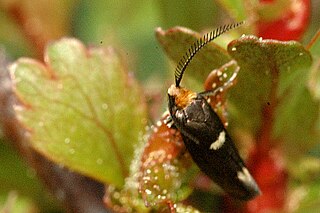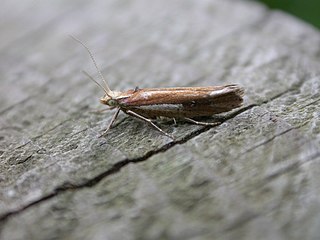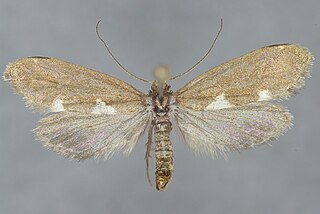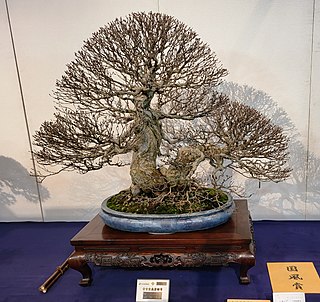
Hornbeams are hardwood trees in the plant genus Carpinus in the family Betulaceae. The 30–40 species occur across much of the temperate regions of the Northern Hemisphere.

Incurvariidae is a family of small primitive monotrysian moths in the order Lepidoptera. There are twelve genera recognised. Many species are leaf miners and much is known of their host plants, excluding Paraclemensia acerifoliella. The most familiar species in Europe are perhaps Incurvaria masculella and Phylloporia bistrigella. The narrow wings are held tightly along the body at rest and some species have very long antennae.

Incurvaria masculella, the feathered diamond-back, is a moth of the family Incurvariidae. It is found in Europe.
Phyllonorycter carpini is a moth of the family Gracillariidae. It is known from Japan (Hokkaidō) and the Russian Far East.

Ypsolopha parenthesella is a moth of the family Ypsolophidae. It is found from Europe to Japan, as well as north-eastern China, Asia Minor and mideast Asia.
Procacitas is a genus of moths of the family Incurvariidae. It contains only one species, Procacitas orientella, which is found in Japan, Russia and North Korea.

Incurvaria vetulella is a moth of the family Incurvariidae. It is found in Fennoscandia, Russia, Germany, Poland, the Czech Republic, Slovakia, Austria, Switzerland, Slovenia, Romania and Bulgaria. In the east, the range extends to Japan.
Vespina nielseni is a moth of the family Incurvariidae. It is found in Japan and the Russian Far East.
Alloclemensia unifasciata is a moth of the family Incurvariidae. It is found in Japan on the islands of Hokkaido, Honshu and Kyushu.
Alloclemensia maculata is a moth of the family Incurvariidae. It is found in Japan on the islands of Hokkaido, Honshu, Shikoku and Kyushu.
Paraclemensia caerulea is a moth of the family Incurvariidae. It is found on the islands of Honshu, Shikoku and Kyushu in Japan.
Paraclemensia oligospina is a moth of the family Incurvariidae. It is found in Japan.
Paraclemensia cyanea is a moth of the family Incurvariidae. It is found on the main island (Honshu) of Japan.
Paraclemensia monospina is a moth of the family Incurvariidae. It is found on Hokkaido island in Japan.
Paraclemensia incerta is a moth of the family Incurvariidae. It is found in Japan and Russia.
Incurvaria takeuchii is a moth of the family Incurvariidae. It is found on the main island (Honshu) of Japan.
Incurvaria alniella is a moth of the family Incurvariidae. It is found in Japan on the islands of Honshu and Kyushu.
Acleris delicatana is a species of moth of the family Tortricidae. It is found in China, Japan and Russia (Siberia).

Carpinus cordata is a species of flowering plant belonging to the family Betulaceae.

Carpinus turczaninovii, the Turczaninow hornbeam or Korean hornbeam, is a species of flowering plant in the family Betulaceae, native to central China, the Korean Peninsula, and central and southern Japan. It is a large shrub or small tree typically 15 to 20 ft tall and about 75% as wide, and is hardy to USDA zone 5b. It is available from commercial suppliers, and can handle very hard pruning.






